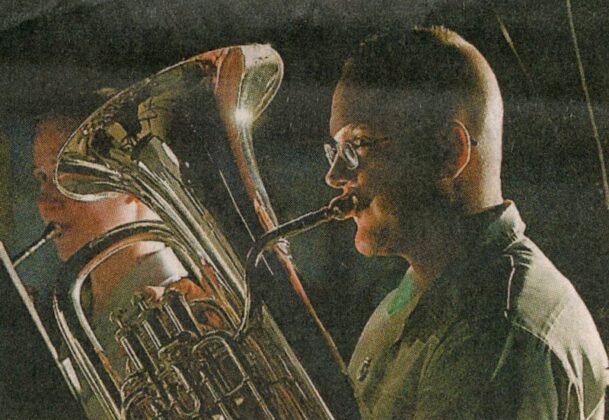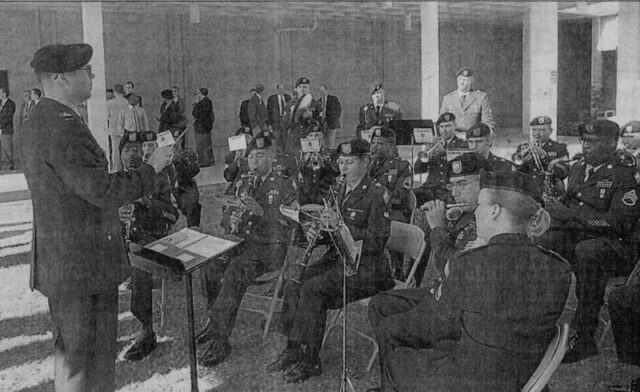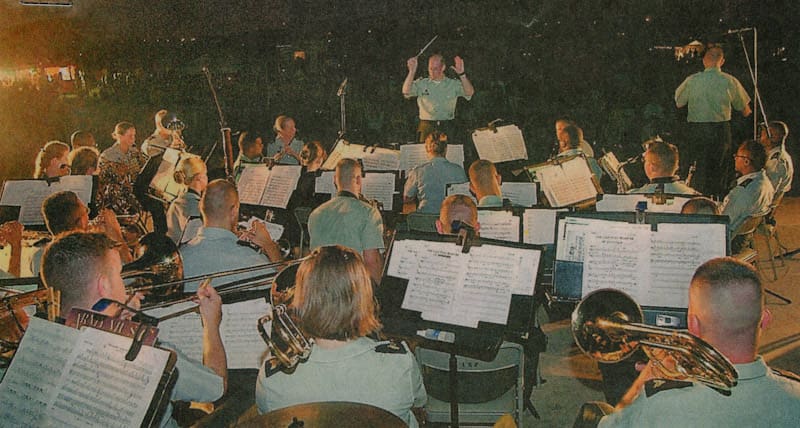Signal Corps Band works year-round
By Jeremy Craig
Staff Writer
When the U.S. Army Signal Corps Band performs as part of Independence Day celebrations tonight at the Jessye Norman Amphitheater, the public will see a band that has been all over the area, playing tunes of patriotism.
Between the solemn patriotic ceremonies of Memorial Day and the jubilant celebrations of the Fourth of July, the band also stays busy playing for change-of-command ceremonies at Fort Gordon.
It’s all part of its service to the country and the community.
“We have to treat every performance as being important,” said Warrant Officer W. Scott MacDonald, the band’s commander and conductor. “If we play at a local elementary school, we can’t say that their performance is any less important than playing for a general”.
The band stays busy all year, its commander said.
“I don’t think we ever have a slow time,” he said, noting that the Signal Corps Band had more than 340 commitments last year. The band, which has about 35 members, has seen fluctuation in its numbers, Warrant Officer MacDonald said, because of the war in Iraq.
Also known as the 434th Army Band, it has different ensembles and arrangements, including an 18-piece band that plays big band standards, a five-piece brass quintet and a group that plays New Orleans-style jazz, Warrant Officer MacDonald said.
Practice is an everyday affair for the Army’s music professionals, who perform on post and at civic functions off post.
But there are some functions where the band can’t play, its commander said.
“We have to be very careful as a government entity that we do only the proper types of events,” he said. “We just can’t provide music for private functions.”
Political events are no-nos as well, he said.
For the most part, though, Warrant Officer MacDonald said the band is able to meet about 90 percent of requests.
During the summer, many of the band’s commitments are outside in Georgia’s sweltering summer. Though band members wear polyester-wool blend uniforms in 90-plus degree weather, they brave the heat to get the job done.
“I tihink we do it with a smile, basically,” Warrant Officer MacDonald said. “I don’t hear too much complaining. We just take it as part of the job.”
There’s also more to performing than just showing up. Everything must be set up right – with the stage ready and the sound system perfect.
And it all has to be taken down, too.
For a 7 p.m. performance, for example, the band would arrive at the venue between 3 and 4 p.m. and take about an hour to set up the stage and do a sound check. Add travel time, and the entire process might take at least eight hours, Warrant Officer MacDonald said.
After a dinner break, the band would then change into dress uniforms and perform, he said.
Band members realize the summer’s going to be a busy time.
But they say they’re ready for it and that they love the opportunity they have to play in the Army.
“There are going to be days where we’re going from one job to the next,” said Sgt. Shelley Terrill, a bassoon player from Pennsylvania. “But you change your mindset.”

“I love to play,” said Spc. Darren Castello, a percussionist from New York. “I’m here to play. The more music, the better.”
Spc. Castello, who has been involved in music since age 15, said the Army has given him a great opportunity to help pay for his education.
“Each one of (the engagements) has its own challenges, but you keep on doing them,” said Staff Sgt. Kurt Zemaitaitis, a trumpet player who has been in the Army for about seven years and played in the NATO band before coming to Fort Gordon.
“That’s the reason we exist,” he said.
The staff sergeant said he might stay in the Army and hopes to one day play for other military bands – including those around Washington.

Warrant Officer MacDonald said musicians join the Army for different reasons and at different ability levels.
“We have a wide range of experiences,” he said.
“Some people we get in are excellent musicians,” he said. “And some we have come in have advanced degrees in music and have been to conservatories and decided they wanted to make music a career.”
“The Army is a great way to do that,” he said.
“That’s how I did that – finished grad school and taught. I said, ‘I really miss playing the trumpet,’ and I really wanted to get back into that.”
U.S. ARMY SIGNAL CORPS BAND
- Also known as the 434th Army Band
- About 35 members
- 340 engagements in 2003
- Band’s ensembles include 18-piece big band, five-piece brass quintet and New Orleans-style jazz band
Archived from scans from page 1A, July 4, 2004. Archived on July 10, 2022.
